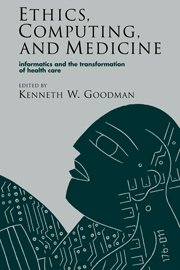Book contents
- Frontmatter
- Contents
- Preface
- List of contributors
- 1 Bioethics and health informatics: an introduction
- 2 Medical informatics and human values
- 3 Responsibility for computer-based decisions in health care
- 4 Evaluating medical information systems: social contexts and ethical challenges
- 5 Health care information: access, confidentiality, and good practice
- 6 Ethical challenges in the use of decision-support software in clinical practice
- 7 Outcomes, futility, and health policy research
- 8 Meta-analysis: conceptual, ethical, and policy issues
- Index
6 - Ethical challenges in the use of decision-support software in clinical practice
Published online by Cambridge University Press: 12 November 2009
- Frontmatter
- Contents
- Preface
- List of contributors
- 1 Bioethics and health informatics: an introduction
- 2 Medical informatics and human values
- 3 Responsibility for computer-based decisions in health care
- 4 Evaluating medical information systems: social contexts and ethical challenges
- 5 Health care information: access, confidentiality, and good practice
- 6 Ethical challenges in the use of decision-support software in clinical practice
- 7 Outcomes, futility, and health policy research
- 8 Meta-analysis: conceptual, ethical, and policy issues
- Index
Summary
Sophisticated machines to assist human cognition, including decision making, are among the most interesting, important, and controversial machines in the history of civilization. Debates over the foundations, limits, and significance of artificial intelligence, for instance, are exciting because of what we learn about being human, and about what being human is good for. Decision-support systems in the health professions pose similarly exciting challenges for clinicians, patients, and society. If humans have had to accept the fact that machines drill better holes, paint straighter lines, have better memory … well, that is just the way the world is. But to suggest that machines can think better or more efficiently or to greater effect is to issue an extraordinary challenge. If it were clear that this were the case – that computers could replicate or improve the finest or most excellent human decisions – then claims to functional uniqueness would need to be revised or abandoned. Clinical decision making enjoys or tries to enjoy status at the apex of rational human cognition, in part because of the richness of human biology and its enemies, and in part because of the stakes involved: An error at chess or chessboard manufacture is disappointing or costly or vexing, but generally not painful, disabling, or fatal. This chapter explores the loci of key ethical issues that arise when decision-support systems are used, or their use is contemplated, in health care.
Information
- Type
- Chapter
- Information
- Ethics, Computing, and MedicineInformatics and the Transformation of Health Care, pp. 102 - 115Publisher: Cambridge University PressPrint publication year: 1997
Accessibility standard: Unknown
Why this information is here
This section outlines the accessibility features of this content - including support for screen readers, full keyboard navigation and high-contrast display options. This may not be relevant for you.Accessibility Information
- 3
- Cited by
